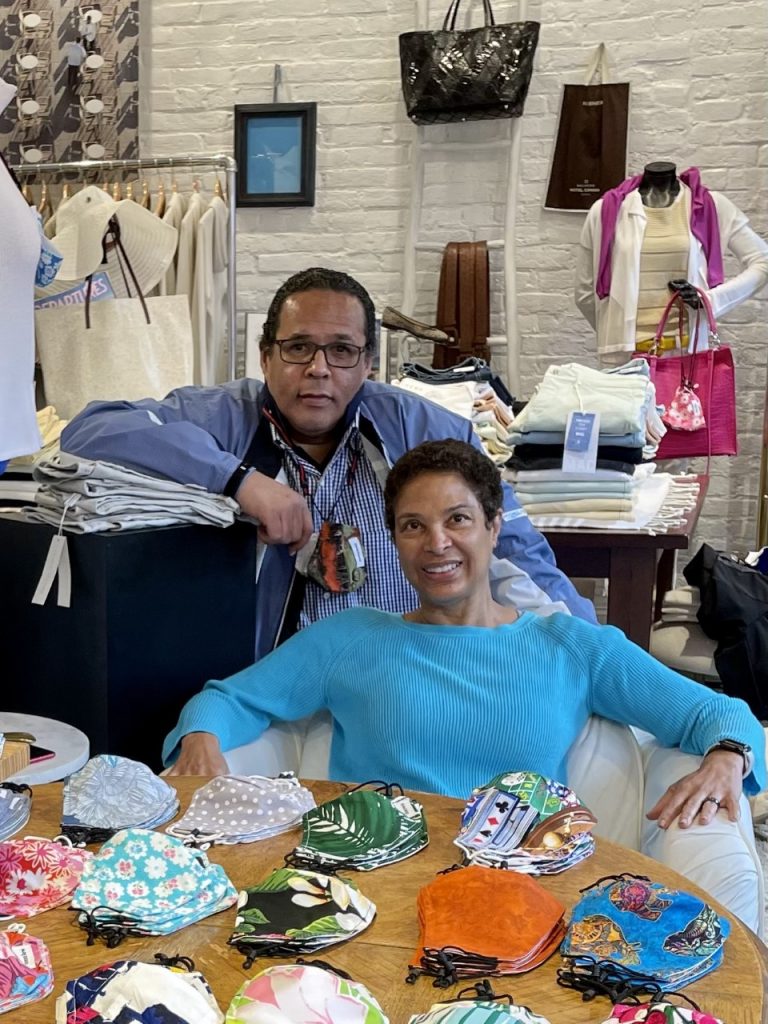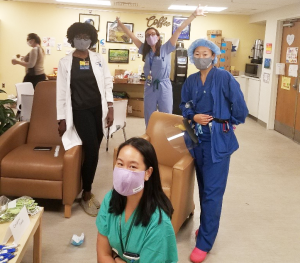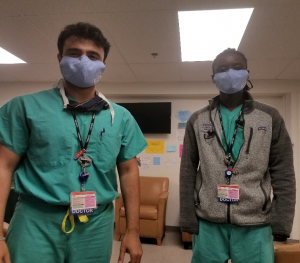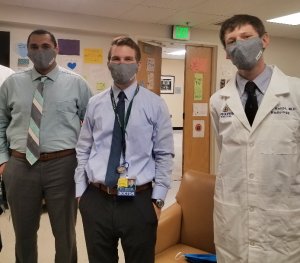Early in the coronavirus pandemic — she remembers because she was on an airplane — Dr. Jessica Bienstock read an article highlighting a D.C.-area designer repurposing springtime frocks into masks and her desire to donate masks to Johns Hopkins. A professor of maternal fetal medicine and the associate dean for graduate medical education at Johns Hopkins, Bienstock oversees 1,400 young physicians. She wrote to the designer, Donna Lewis, and introduced herself.

“We were trying to think of things we could do to buoy the residents’ spirits,” Bienstock says. “The Donna Lewis folks were great. They said, ‘We’ll send you masks to at least let them know the community appreciates them.’”
In April 2020, after realizing there wasn’t much of a need for fun-print sundresses, Lewis and her husband Chris began making the masks. They initially gave them to family and clients.
“We started cutting up our clothing,” she says. “It was a combination of a way to keep our tailors employed and to do something with this fabric that was going to go to waste. It’s bittersweet; so it’s great to be able to, instead of something sitting and gathering dust, transform them into something useful.”
Lewis adds that the 20-year-old “mom-and-pop shop” had never before ventured into e-commerce, but the pair put the masks online to see if there was any interest from potential buyers. Their popularity skyrocketed, thanks in part to Speaker of the United States House of Representatives Nancy Pelosi donning them on the House floor.

“We were really completely blown over by the response to and popularity of the masks. There was suddenly just a huge interest on every front,” Lewis says. “I was uncomfortable with making a profit off of a bad situation. I said, ‘Let’s find a way we can give back.’ I was thrilled that it ultimately appeared to fill a need.”
Lewis and her team committed to donating a mask to Johns Hopkins Medicine for every mask they sold. The connection was personal for Lewis, whose father was a patient at Suburban Hospital, a Johns Hopkins community hospital located in Bethesda, Md., towards the end of his life. She was also inspired to support Hopkins as “the foremost medical institution when it comes to COVID and infectious diseases.”
In the last year, the business has donated more than 10,000 masks.

“The residents love them. I’ve had residents stop and say they really feel cared about,” Bienstock says. “They’re working so hard. They’re in really intense settings, often in the COVID intensive care units in full PPE for weeks at a time. The community reaching out to the residents has been so important in letting them know their hard work is appreciated.”
As the need for new masks at Johns Hopkins began to decrease, Lewis’ team decided to use $15,000 of the proceeds from their mask sales to further support the residency programs. The Johns Hopkins House Staff Council used the funds to work with local, Black-owned restaurants to provide dine-and-dash dinners for residents and their significant others at home. This “circle of good” provides employment for the local Baltimore community while simultaneously nourishing the residents as they dedicate themselves to caring for their patients.
Lewis has also given an additional $15,000 from mask sales to support virtual visitation, something Zach Lawrence, senior project administrator in the Department of Service Excellence in the Johns Hopkins Health System, says has been a very important part of making sure all patients can connect with their families.

“We really were able to do some remarkable work, sometimes in a person’s last days,” he says. “In our time of need as providers, it allowed us to do our job connecting patients and families.”
Each inpatient room in East Baltimore now has a tablet or iPad equipped with access to unlimited Zoom calls. Lawrence says the ability to provide virtual visitations has helped lift the spirits of clinical and non-clinical staff.
“Not everyone has a personal device. We heard often from our staff how heart-wrenching it was not to be able to have patients see their families,” he says. “The gift really aligns with the mission of our health system — to serve our communities.”
Topics: Friends of Johns Hopkins Medicine, Johns Hopkins Medicine, School of Medicine, Promote and Protect Health, Support Scholars